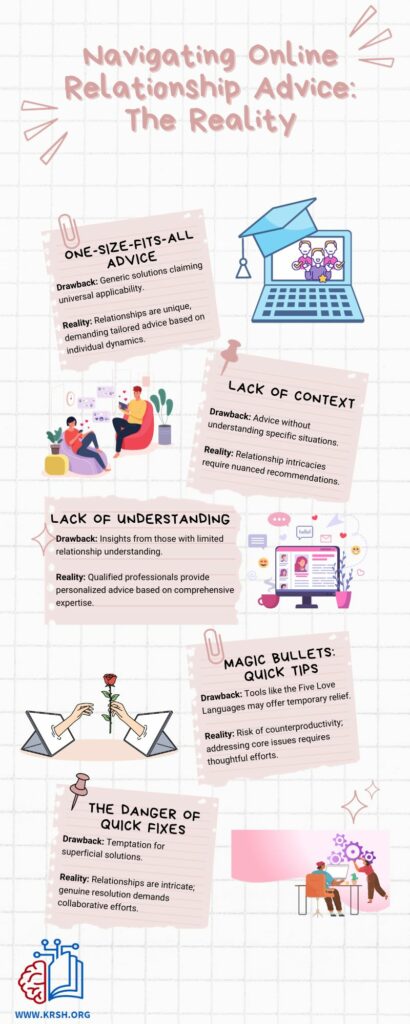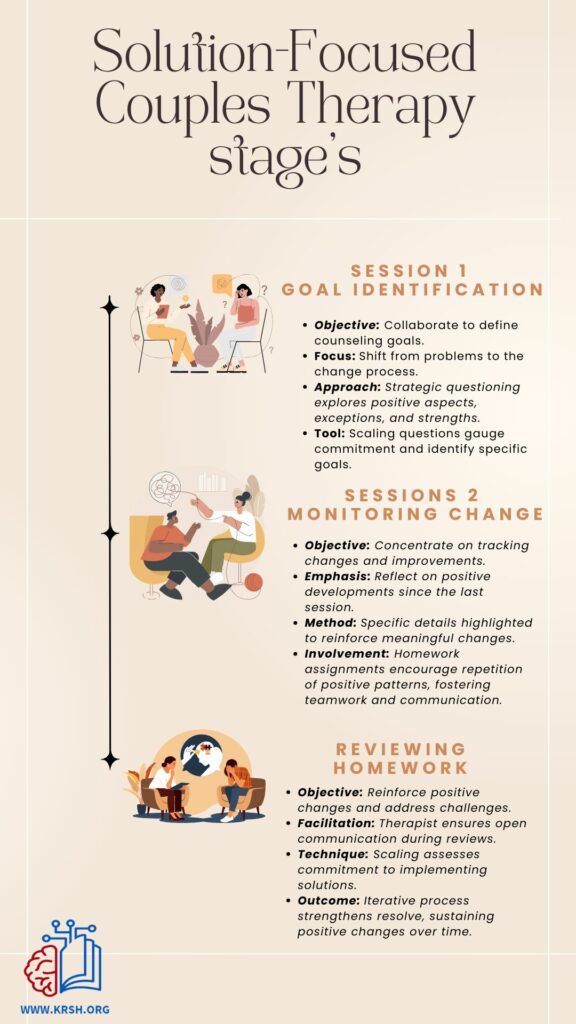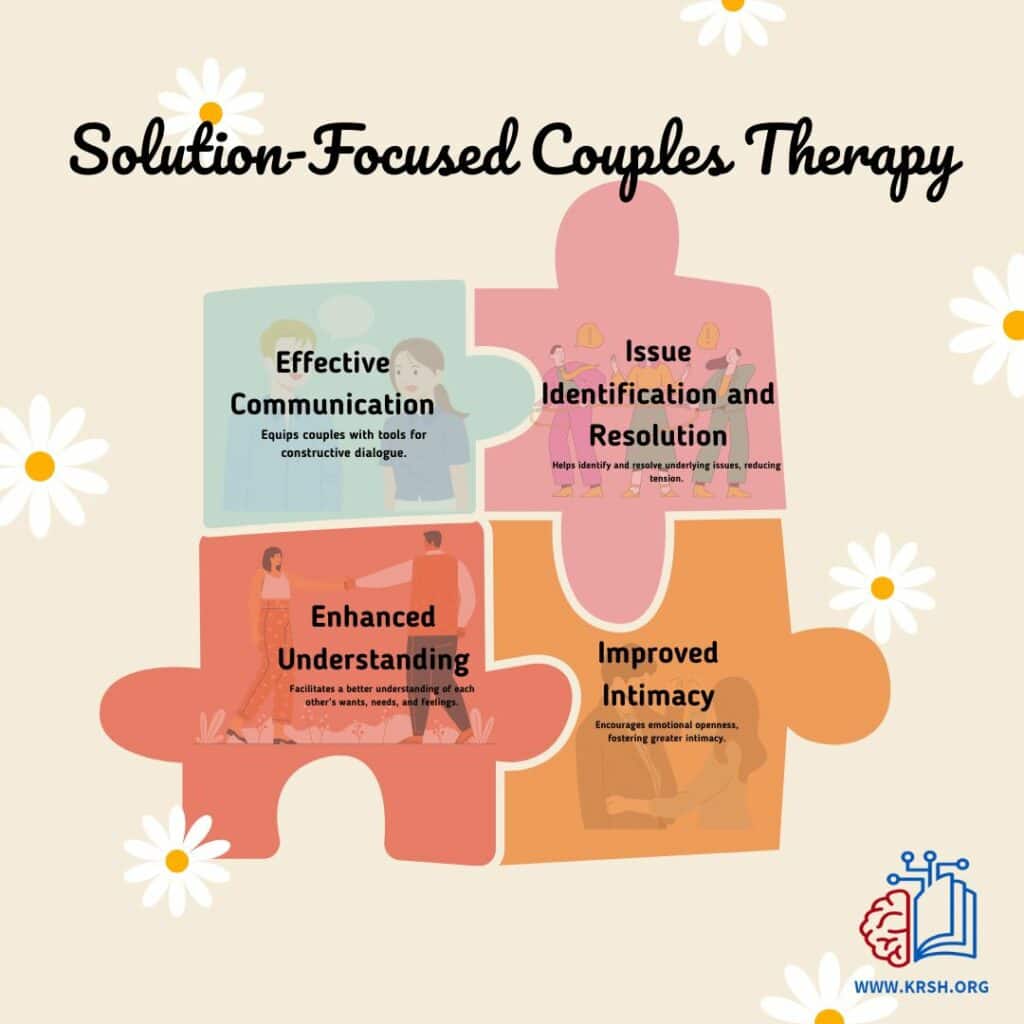Couples therapy is vital for addressing relationship challenges, offering a personalized approach to overcome issues and strengthen connections.
Myths about fixing relationships often involve one-size-fits-all advice from online sources, lacking context and understanding of the unique dynamics in each relationship.
The Solution-Focused Approach in couples therapy stands out by emphasizing positive change, effective communication, and tailored solutions, fostering a deeper understanding and improving overall relationship satisfaction.
Truth About Fixing Relationships

Seeking advice for relationship issues is as easy as a few clicks. While online platforms offer a plethora of tips and tricks, it’s crucial to understand the limitations and potential risks associated with relying on virtual guidance.
The same goes for advice from people who do not understand your relationship deeply. The most common advice doled out is to improve communication. The fact is, you both cannot come together in the first place if there was no proper communication. Both of you already want to improve communication, that’s why you are taking the relation stress. The solution required is HOW to improve communication. The HOW includes cultural background, personal preferences, past experiences, aspirations and many other things which make our lives.
Here are compelling reasons why one should exercise caution over such advice and consider alternative avenues such as couple therapy.
1. One-Size-Fits-All Advice
Online advice often takes a generic approach, providing solutions that claim to fit all relationships. However, relationships are unique, shaped by individual personalities, histories, and dynamics. What works for one couple may not necessarily work for another. Tailoring advice to specific circumstances is crucial for its relevance and effectiveness.
2. Lack of Context
Relationship advice on the internet lacks the context necessary for a thorough understanding of complex situations. Every relationship has its intricacies, and offering advice without considering these nuances may lead to misguided recommendations. It’s essential to recognize and address the specific circumstances and dynamics unique to each relationship.
3. Lack of Understanding
Online platforms may host advice from individuals with limited understanding of healthy relationships or insufficient life experience. To navigate the complexities of relationship challenges, seeking guidance from qualified professionals, such as licensed therapists, becomes imperative. These experts are trained to provide personalized advice based on a comprehensive understanding of mental health and relationship dynamics.
4. Biased Perspectives
People offering online advice bring their own perspectives and experiences into play. These biases can influence the guidance provided, potentially steering individuals in directions misaligned with their values or what’s best for their relationship. It’s crucial to be discerning about the sources of advice and consider whether the perspectives align with one’s own beliefs and relationship goals.
5. The Danger of Quick Fixes
The allure of quick fixes can be tempting, especially when faced with the complexities of relationship issues. However, relationships are not mechanical systems that can be easily repaired with a set of instructions. Quick advice might offer temporary relief, but it often fails to address the root causes of problems. A genuine resolution requires thoughtful and collaborative efforts to work through challenges rather than seeking superficial solutions.
6. Magic Bullets: Solutions or Quick Tips
Certain popular relationship advice, akin to magic bullets, may initially seem effective but often fall short in the long run. Take, for example, the concept of the Five Love Languages. While the ideas behind such tools aren’t inherently flawed, they can become counterproductive when used as a one-size-fits-all solution. The risk is that these tools might feel forced, leading to a temporary improvement that doesn’t address the core issues within a relationship.
While online advice may offer convenience, it’s essential to approach it with caution. Seeking guidance from qualified professionals, like the therapists at Krsh Welfare Foundation, ensures a personalized and informed approach to address the intricacies of relationship challenges. Your relationship is unique, and solutions should be tailored to your specific circumstances.
List of Issues Solved by Couples Therapy
Personal relationships play a vital role in human life. Every type of relation has its unique place- be it close friends, romantic lovers, husband-wife, parental love or others. Feeling of acceptance and belongingness are a basic need of human life. Fulfillment of this need results in happiness while non-fulfilment can lead to frustration and ill-health.
We’ve made a exhaustive list below on what may hold you back in fulfilling your basic need. A realistic couples therapy should take of these and many others.
- Lack of Trust: Doubting your partner or constantly questioning their honesty.
- Overwhelm: Allowing external pressures to overshadow your relationship, leading to neglect.
- Poor Communication: Ineffective communication causing misunderstandings, fights, and frustration.
- Not Prioritizing Each Other: Taking your partner for granted and neglecting quality time together.
- Money Stress: Financial disagreements causing stress and conflict in the relationship.
- Changing Priorities: Evolving individual goals causing conflicts in shared aspirations.
- Chore Wars: Disputes over household responsibilities leading to relationship tension.
- Different Intimacy Needs: Discrepancies in sexual preferences or frequency causing dissatisfaction.
- Lack of Appreciation: Feeling undervalued or taken for granted in the relationship.
- Children: Disagreements on parenting styles, leading to relationship strain.
- Over-involvement: Losing individuality and feeling suffocated in the relationship.
- Infidelity: Betrayal of trust through actions like flirting, sexting, or cheating.
- Significant Differences: Fundamental disparities in core values leading to frequent arguments.
- Jealousy: Insecurity and distrust causing issues within the relationship.
- Unrealistic Expectations: Expecting too much from your partner, leading to disappointment.
- Growing Apart: Drifting away emotionally, causing a lack of connection.
- Lack of Support: Insufficient emotional support affecting the relationship’s satisfaction.
- Addiction: Substance abuse affecting the relationship’s well-being.
- Moving at Different Speeds: Divergent paces in the relationship causing disagreements.
- Lack of Responsibility: Avoiding accountability leading to various relationship problems.
- Controlling Behavior: Dominating actions restricting the partner’s freedom and confidence.
- Boredom: Monotony and apathy causing a decline in relationship satisfaction.
- Outside Influences: External opinions affecting the relationship negatively.
- Ineffective Argument: Unhealthy argument patterns damaging the relationship.
- Keeping a Scoreboard: Holding onto past mistakes, leading to resentment.
- Life Gets in the Way: Prioritizing other aspects of life over the relationship.
- Trust Issues from the Beginning: Carrying baggage from past relationships affecting trust.
- Readjusting Goals: Misalignment in life goals leading to relationship challenges.
- Lack of Manners: Decline in politeness and appreciation in the relationship.
- Continued Bad Behaviors: Persistent disrespectful actions affecting the early stages of a relationship.
Solution-Focused Couples Therapy
Solution-Focused Brief Therapy (SFBT) offers a unique perspective on addressing marital disharmony. We emphasize on SFBT for couples therapy at Krsh. In contrast to traditional therapy, SFBT encourages couples to envision their desired future rather than fixating on problems. With a focus on change and a limited timeframe of around eight sessions, SFBT fosters a positive and solution-oriented atmosphere from the outset.

Session 1: Goal Identification
In the initial session, the therapist collaborates with the couple to define their goals for counseling, shifting the focus from problems to the process of change. Employing strategic questioning, the therapist explores positive aspects of the relationship, seeking exceptions and strengths that can be built upon. Scaling questions are used to gauge the couple’s commitment to change and identify specific goals.
Sessions 2 and Beyond: Monitoring Change
Subsequent sessions concentrate on tracking changes and improvements. The therapist prompts the couple to reflect on what has changed since the last session, emphasizing positive developments. Specific details are highlighted, reinforcing the meaningfulness of these changes. Homework assignments play a crucial role, encouraging the couple to repeat positive patterns and observe outcomes, fostering teamwork, communication, and negotiation.
Reviewing Homework
Reviewing homework assignments focuses on reinforcing positive changes and addressing challenges. The therapist facilitates open communication, using scaling techniques to assess the couple’s commitment to implementing solutions. This iterative process aims to strengthen the couple’s resolve and sustain positive changes over time.
Benefits of Solution-Focused Couples Therapy

1. Effective Communication
SFBT equips couples with tools for constructive dialogue, enhancing communication skills. This leads to a stronger connection, improved trust, and an overall healthier relationship.
2. Issue Identification and Resolution
By promoting open communication, SFBT helps couples identify and resolve underlying issues, reducing tension and conflict. This results in increased satisfaction, security, and trust in the relationship.
3. Improved Intimacy
SFBT encourages couples to open up emotionally, fostering greater intimacy. This deeper connection contributes to an overall improvement in the relationship and a heightened sense of closeness.
4. Enhanced Understanding
The therapy facilitates a better understanding of each other’s wants, needs, and feelings. This improved empathy fosters greater satisfaction, improved communication, and enhanced conflict resolution skills.
Relationships are precious and special. That’s why they require special care. Many times there can be problems in relationships due to ego, misunderstandings, miscommunications, bad habits, expectations, infidelity, etc., but there are some good ways to sort them out. Handholding by a professional for couples therapy can shorten the journey to cherished moments.
References for Solution-Focused Couples Therapy
- [1] http://psychclassics.yorku.ca/Maslow/motivation.htm
- [2] https://www.ncbi.nlm.nih.gov/pmc/articles/PMC4012696/
- [3] https://www.tinatessina.com/
- [4] https://poppyandgeoff.com/
- [5] https://journals.sagepub.com/doi/abs/10.1177/0963721414530143
- [6] https://family.drlaura.com/b/6-Reasons-Your-Relationship-Is-Bound-to-Fail/51816723904463376.html
- [7] https://journals.sagepub.com/doi/10.1177/01461672211016920
- [8] https://www.psychologies.co.uk/the-importance-of-quality-time/
- [9]https://greatergood.berkeley.edu/article/item/how_gratitude_helps_your_friendships_grow#:~:text=A%20great%20deal%20of%20research,to%20be%20more%20helpful%20coworkers.
- [10] https://www1.health.gov.au/internet/main/publishing.nsf/Content/phi-natural-therapies-submissions-containerpage/%24file/PACFA%20Family%20Therapy%20lit%20Review.pdf